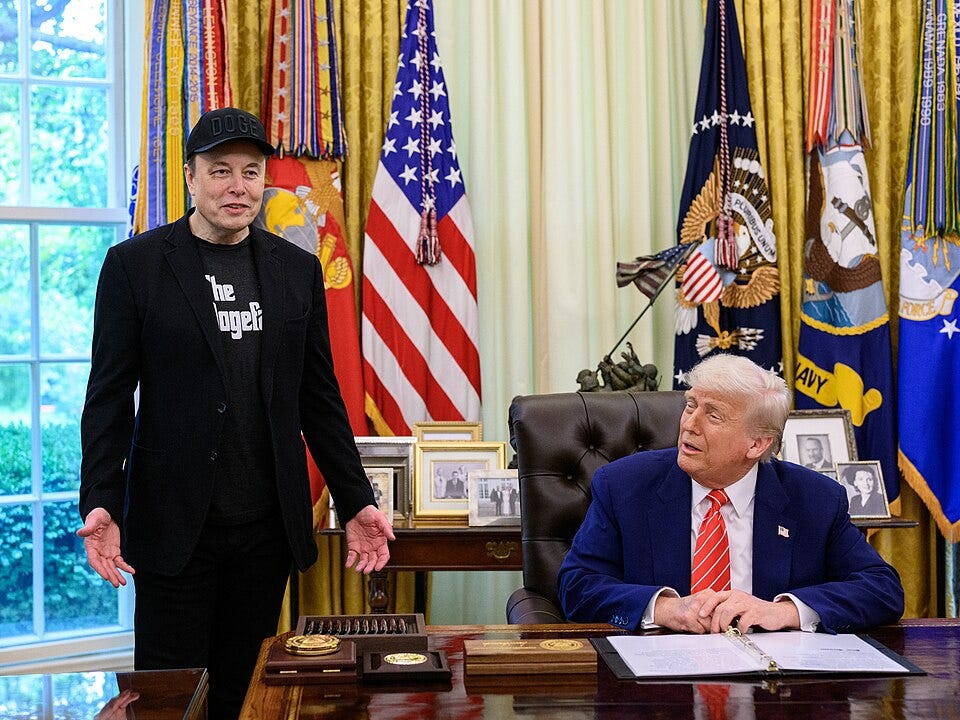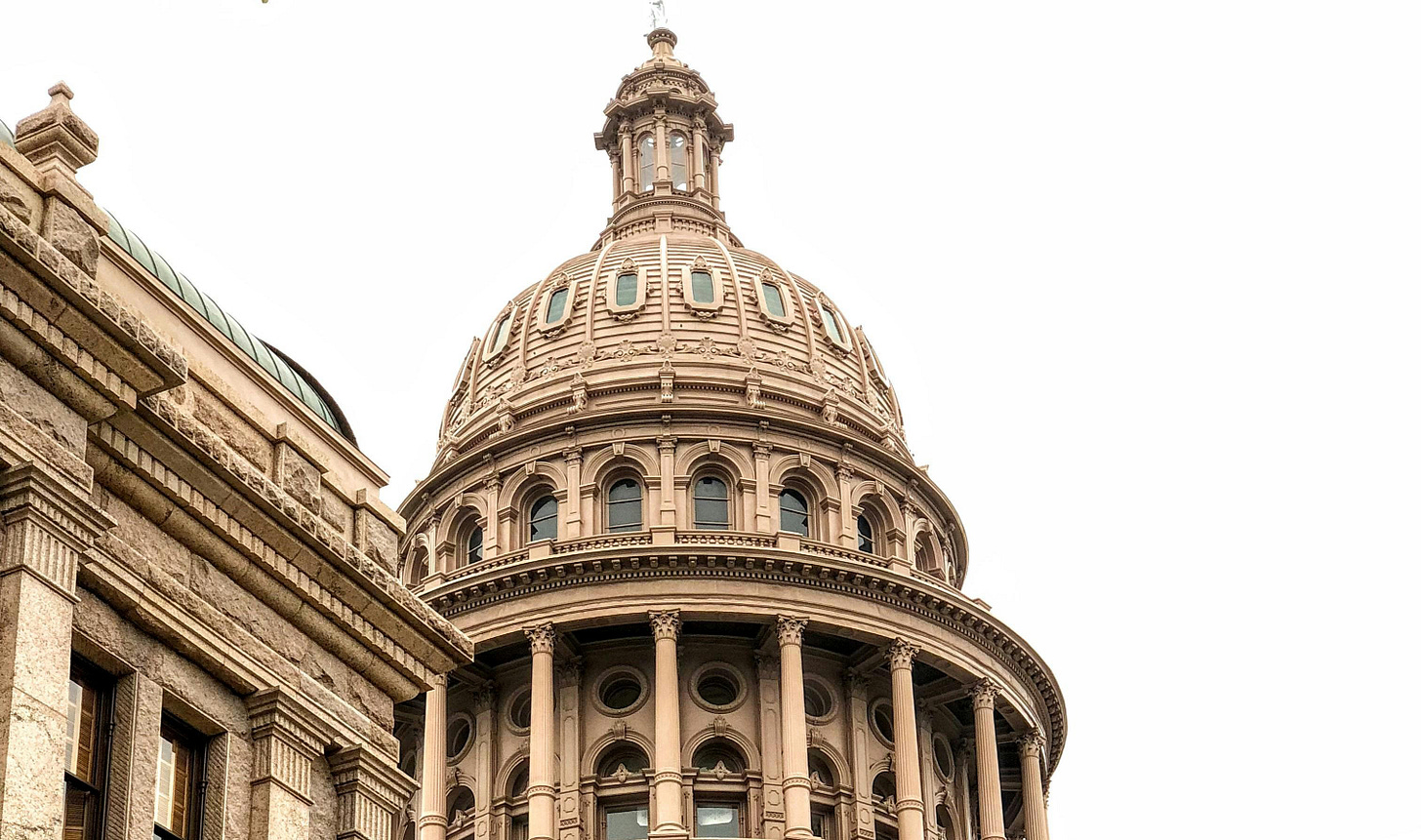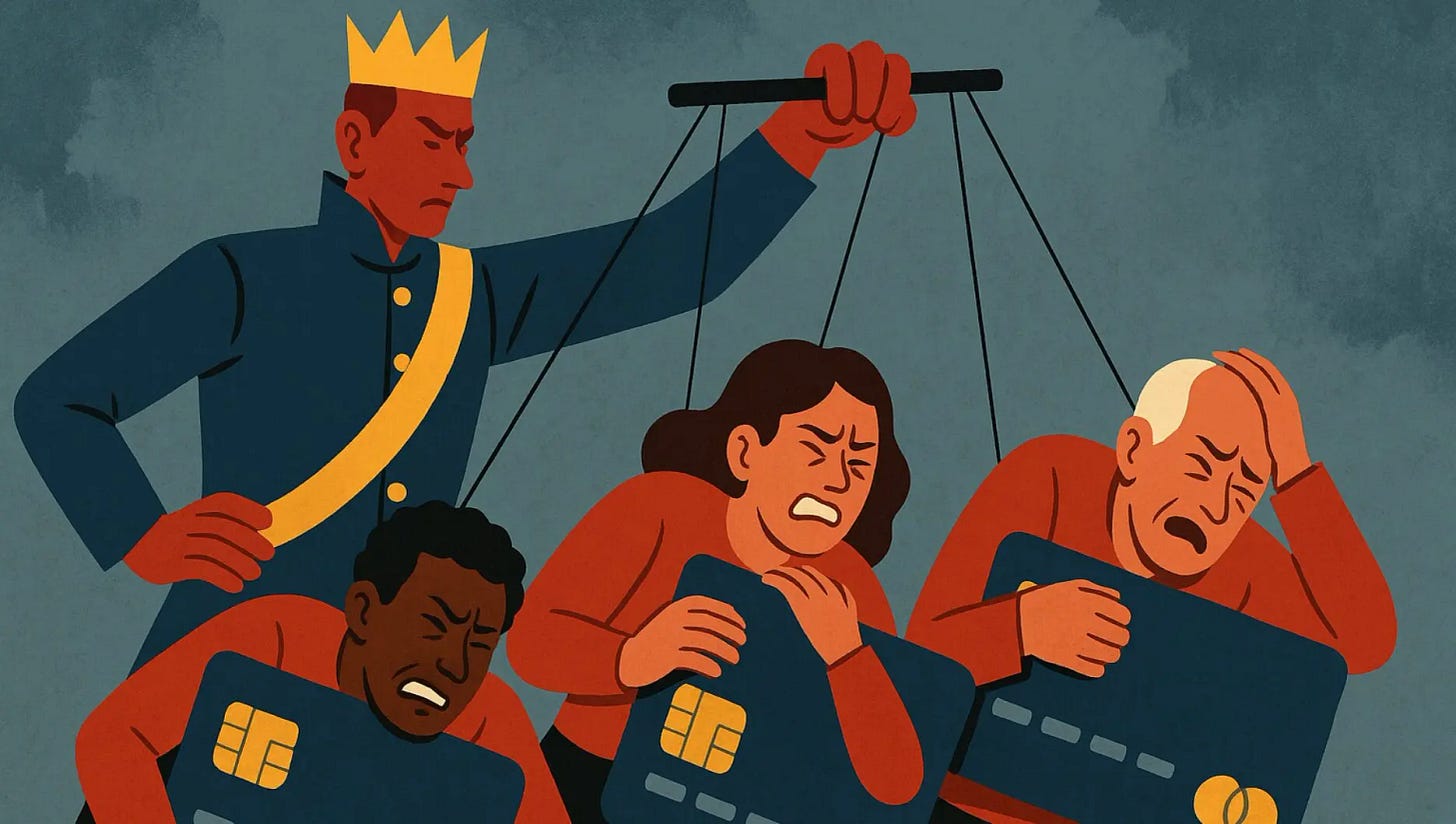From LA Riots to BBB: The Real Crisis Facing America | This Week's Economy Ep. 116
Overspending in Washington is the true national emergency we must address.
Hello Friends!
There’s been a lot of conflict making headlines lately—from the clash between Elon Musk and President Trump over the “Big, Beautiful Bill” (BBB) to riots in Los Angeles sparked by immigration raids. These events all point to the true national emergency: overspending in Washington.
Congress has a critical opportunity to take action. As a strong advocate for sustainable budgeting, we must cut current spending, not just slow the growth as in “DC speak,” but actually reduce spending to at least 2019 levels before COVID nonsense, and cap annual spending growth to a maximum rate based on population growth plus inflation. Instead, lawmakers discuss raising the federal debt ceiling by up to $5 trillion with the BBB.
In this week’s episode, I explain why now is the time to restore fiscal discipline. Americans are already feeling the strain of rising costs due to inflation. Our leaders have the power to address this crisis by tackling Washington’s out-of-control spending. Watch the full episode on YouTube, Apple Podcast, or Spotify, and visit my website for more information.
1. BBB Progress Unfolding

In the News:
After a falling out between President Trump and Elon Musk over the One Big, Beautiful Bill’s (BBB) failure to tackle overspending, Senate Republicans are now split on how to reduce the cost of the House-passed legislation. Fiscal conservative senators argue that the bill falls short of addressing the deficit, pointing to raising the national debt ceiling by up to $5 trillion. Sources: The Hill and MSN
My Take:
Overspending is the Major Downside: The biggest flaw in the BBB is that even with $1.6 trillion in “DC cuts” over a decade, we’re still looking at more than $80 trillion in federal spending during that time. That’s not sustainable. Policymakers, like Senator Rand Paul (R-KY) and Congressmen Chip Roy (R-TX) and Thomas Massie (R-KY), are rightly concerned about the long-term sustainability of such spending. What we need now is fiscal discipline. A good starting point would be cutting federal spending of about $7 trillion today to pre-COVID levels of $4.6 trillion (which is what it was when I was chief economist of the Trump 45 White House’s OMB). Then, Congress should impose a strict fiscal rules that limits annual spending growth to the rate of population growth plus inflation.
Medicaid Reform is Still Necessary: While the BBB does introduce work requirements for work-capable (“able-bodied”) adults on Medicaid—an important step—there’s still significant waste and abuse within the program. True reform must go further, ensuring the program serves only the most vulnerable while addressing inefficiencies and curbing overspending.
Tax Reform Needs to Be Bolder: The BBB falls short on delivering meaningful tax reform. Instead of bold, pro-growth changes, it settles for half-measures. This includes welfare expansion of increasing the child tax credit from $2,000 to $2,500, picking winners by eliminating taxes on tips and overtime pay, and raising the SALT cap for households from $10,000 to $40,000, which is a windfall to high-income earners in high-tax, mostly blue states. These actions only preserve existing loopholes, increase complexity, and favor particular groups. A real solution would include making full expensing permanent, which Senate Majority Leader John Thune (R-SD) recently said could happen, flattening tax brackets, reducing marginal tax rates, and lowering the corporate rate to support economic growth.
Related: In a recent This Week’s Economy episode, I discussed the pros and cons of the One Big, Beautiful Bill that passed the House.
2. Connection Between Spending & the LA Immigration Riots

In the News:
In response to the Trump administration’s immigration raids, Los Angeles has experienced several days of public protests, which have escalated into violence there and in other states. President Trump deployed the National Guard and Marines to restore order in LA, which California Governor Gavin Newsom (D-CA) and other local leaders opposed. Source: Reuters
My Take:
Failure of Both Parties: The recent LA riots over deportations aren’t about justice—they’re a violent symptom of a broken immigration system that both parties have failed to fix. Democrats fuel chaos with sanctuary policies, while Republicans respond with ineffective walls and bloated budgets.
The Real National Emergency: The real national emergency isn’t just lawlessness in the streets—it’s the lawlessness in Washington’s budget. The impulse to “do something” by spending more and expanding government is exactly how we got here. With the federal government running nearly $2 trillion annual deficits and $37 trillion in debt, our path is unsustainable—and it’s the biggest threat to our freedom and prosperity.
Less Government, More Efficiency: We don’t need more government; we need less spending, fewer regulations, secure borders, and a market-based immigration system that works. That means legal worker auctions, no welfare, and borders that respect supply and demand. Fix the system. Stop the riots.
Related: Check out my Sustainable Budget work for solutions to addressing spending on Substack and at Americans for Tax Reform.
3. Texas Session Impacts

In the News:
The 89th Texas Legislature recently adjourned Sine Die with the largest budget in the state’s history. Gov. Greg Abbott (R-TX) signed an $8.5 billion funding bill for Texas government schools. State leaders also pushed to spend $50 million on researching a psychedelic drug called ibogaine while banning hemp and THC, which the latter has yet to be signed by Gov. Abbott. Source: Texas Tribune, Fox 7 Austin, and Texas Tribune
My Take:
Fiscally Irresponsible Budget: Texas wrapped up its most fiscally irresponsible and anti-taxpayer legislative session. Instead of using the $24 billion in overcollected taxpayer money (“surplus”) for property tax relief, the state chose to spend most of it and provide just $6.5 billion in new property tax relief, primarily by raising the homestead exemption to $140,000 for families and $200,000 for seniors. This is a step in the wrong direction for Texas taxpayers.
Unnecessary Funding for Drug Trials: Another example of reckless spending is $50 million in funding for an ibogaine drug trial, even though the drug is illegal under federal law, and the state is cracking down on recreational use of cannabis. Why is Texas funding so much nonsense? Where are consistent, principled leaders? This is precisely the type of spending we need to address.
Meritless Pay Raises for Teachers: Governor Abbott signed an across-the-board pay raise for government-school teachers without regard to merit, paid for by taxpayers. This type of spending resembles socialism. It's time to return to a free-market approach in Texas by spending less and providing true universal school choice. NH recently became the 5th state to have universal school choice through ESAs, while 17 states now have universal eligibility but not funding for everyone who wants an ESA.
Related: Texas passed an enormous budget this session. I explain why this sends a dangerous signal and what should be done.
4. Market Health Update

In the News:
The latest jobs report shows a slowdown in U.S. job growth for May, attributed mainly to rising uncertainty surrounding the Trump administration’s import tariffs. Meanwhile, the Consumer Price Index (CPI) increased by 0.1% for the month, bringing the annual inflation rate to 2.4%. Sources: Reuters and CNBC
My Take:
Recent Jobs Report Results: May’s jobs report confirms concerns about a weakening labor market and growing uncertainty. While the headline figure of +139,000 jobs might seem positive, the household survey—which offers a clearer picture of real people and small businesses—paints a much less optimistic view. Washington’s recent policies are making the situation worse, not better.
What the CPI & PPI Reveal: The Consumer and Producer Price Indexes show that inflation remains stubbornly high. This is due mainly to continued budget deficits, the Federal Reserve's bloated balance sheet, and an expanding money supply. Inflation isn’t "cooling" by accident—it's being suppressed by weakening demand and temporary tariffs. Inflation could spiral out of control if money creation accelerates to cover persistent deficits and erratic trade policies. It’s time to stop kicking the can down the road and address the root cause—the Fed.
No More Industrial Policy or Bloated Bills: We need sustainable, pro-growth reforms: capping spending to align with population growth plus inflation, balancing the budget, flattening the tax code, reducing red tape, and promoting free trade. Real prosperity doesn’t come from central planning—it thrives when people are free to exchange, specialize, and build without excessive government interference.
Related: Read my deep dive on the May 2025 Jobs Report on X.
5. Talking Taxes and Tariffs

In the News:
Shifting trade policies under the Trump administration disrupt businesses' ability to plan for the future, leading to hiring freezes and stalled investments. In its twice-yearly Global Economic Prospects report, the World Bank cut its forecast for global GDP growth by 0.4%, predicting the slowest growth since 2008 outside of full-blown recessions. The administration responds that tariffs will generate tax revenue to help reduce the federal deficit. Sources: The Wall Street Journal, The Guardian, and CBS News
My Take:
The Problems of Uncertainty: I’ve been warning about this uncertainty caused by tariffs and its detrimental impact on American businesses. These are real, problematic consequences of the Trump administration’s trade war, and companies and workers already feel the effects.
Tariffs Are Just Taxes on Americans: Tariffs won’t generate revenue for tax cuts; they’re simply a form of taxation. Tariffs also aren’t a clever negotiating tactic—they hurt American families and businesses by raising taxes that increase prices, slow economic growth, and provoke retaliation from trading partners.
Real Solutions to the Trade War: The economy isn’t struggling because we’re undertaxed—it’s because we overspend, overregulate, and are misled by decades of wishful thinking. We can’t solve this problem by threatening free trade and taxing Americans with tariffs.
Related: Emily Jashinsky and I discuss my experience working in the first Trump White House and how Trump’s tariff regime will hurt workers and promote an “America Last” economy on Undercurrents.
Thanks for joining me in this episode of "This Week's Economy." For more insights, visit vanceginn.com and get even greater value with a paid subscription to my Substack newsletter at vanceginn.substack.com.
God bless you, and let people prosper!
THANK YOU for being a paid subscriber!
Don’t miss this short video from the episode.
Are Trump’s Tariffs Free?
More from Me:
Vance Ginn Liberals on the left claim free markets keep people poor, but is that reality my recent conversation with Lars Larson.
My Latest Commentary at Texans for Fiscal Responsibility.
Government Price Controls on Credit Cards Hurt People
As Congress revives the misnamed Credit Card Competition Act and state legislatures push bills to regulate swipe fees, policymakers are quietly setting the stage for a major disruption in how Americans access credit. These proposals aim to cap interchange fees—those small charges behind every card swipe—but the consequences won’t be small.
Interchange fees may not make headlines, but they help keep the modern credit ecosystem running. On a typical $100 transaction, around $2 in interchange fees flows from merchants to the banks and networks that manage fraud protection, secure payments, and rewards programs. In return, consumers get safer transactions and access to credit, and merchants get more customers.
The bills in a few states, like Texas’s HB 4124, which died this year, aim to ban interchange fees on tax and tip portions of transactions. That might sound like a narrow carve-out. But it’s not. It’s a price control, and price controls are costly. Like a leak in the hull, they start small and quickly sink the ship.
I don’t come at this from theory. I grew up in a lower-income single-mom household in South Houston, Texas. My dad had epilepsy and received disability income. My mom dropped out in the tenth grade and worked hard to make ends meet. We didn’t qualify for most welfare, and credit cards were the fallback when times got tough. My mom didn’t use them for luxuries—she used them for groceries, utility bills, and school clothes. That access mattered.
Now imagine her in today’s regulatory environment, where policymakers treat credit like a vice rather than a necessity. The Credit Card Competition Act would force issuers to use multiple payment networks, undermining fraud security and disrupting rewards programs, like the Chase Southwest card I use for travel with my family. Meanwhile, proposals from Sens. Elizabeth Warren and Bernie Sanders to cap credit card interest rates at 10% would cut off millions of higher-risk borrowers, disproportionately harming those with the fewest alternatives.
This all echoes the failed logic of the Durbin Amendment of 2010. That policy capped debit card fees and promised consumer savings. Instead, no-charge checking accounts were cut in half, debit rewards disappeared, and according to the Government Accountability Office, less than 2% of retailers passed on any savings. The real beneficiaries were the big-box stores, not everyday Americans.
Supporters claim they’re protecting consumers. But who are they really protecting when 22% of Americans are unbanked or underbanked, according to the Federal Reserve? When you price credit below its risk, lenders stop offering it. That leaves working families to turn to payday lenders or pawn shops—or worse, to go without.
Meanwhile, the Federal Reserve—the very institution regulators want to give more power over payment systems—has lost more than $200 billion in operating losses since 2022 due to its mismanagement of interest rate risk. And now it wants to fix the “problem” of interchange fees?
If lawmakers genuinely want to improve access and competition, they should focus on reducing barriers for smaller banks and fintech innovators, not micromanaging transaction fees or capping risk-based interest rates. These reforms would encourage real competition, protect consumers, and avoid the failed playbook of regulatory overreach.
Milton Friedman once warned that “one of the great mistakes is to judge policies and programs by their intentions rather than their results.” We should heed that wisdom now more than ever.
The intention to lower swipe fees and protect consumers is good in a soundbite. However, the result will be fewer rewards, higher costs, and less access, especially for working Americans. That’s not financial protection. That’s economic sabotage.








